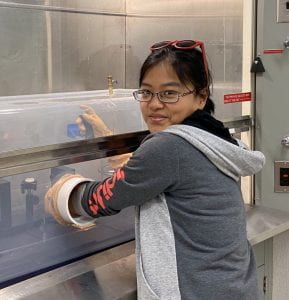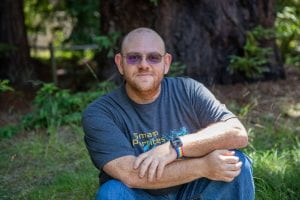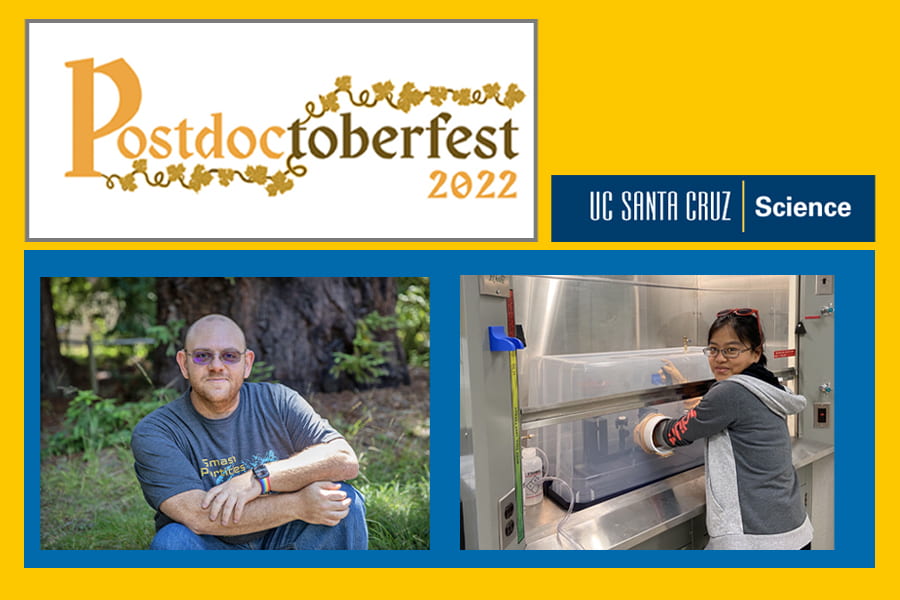 Postdoctoral scholars at UC Santa Cruz participate in cutting-edge research while in this ultimate phase of their academic training. Many scholars are preparing to enter the academy, while some are preparing for non-academic careers or professions that merge the two domains. They are active in bringing grant funding to UCSC and with that the notice of other research institutions, government, and industry involved in their fields of study. Throughout October 2022, UCSC celebrates postdocs’ contributions to and enrichment of our campus with Postdoctoberfest! In the Physical & Biological Sciences Division, we’re highlighting the work of Dr. Yu and Dr. Stark.
Postdoctoral scholars at UC Santa Cruz participate in cutting-edge research while in this ultimate phase of their academic training. Many scholars are preparing to enter the academy, while some are preparing for non-academic careers or professions that merge the two domains. They are active in bringing grant funding to UCSC and with that the notice of other research institutions, government, and industry involved in their fields of study. Throughout October 2022, UCSC celebrates postdocs’ contributions to and enrichment of our campus with Postdoctoberfest! In the Physical & Biological Sciences Division, we’re highlighting the work of Dr. Yu and Dr. Stark.
Dr. Xinting Yu
Xinting Yu, Ph.D., a postdoctoral scholar in Earth and Planetary Science, focuses on characterizing and understanding planetary materials using experimental science techniques. Her experimental work also interfaces with theoretical modeling to understand various atmosphere and surface processes in planets in and beyond our solar system. Yu became interested in working in a lab and playing with various planetary materials in graduate school, but during her postdoctoral appointment she found a treasure box: she also now does cool theoretical work to predict how processes on other planets work by measuring the properties of materials in the lab.

For example, she and her student Jialin Li have been measuring a surface property of some organics that they believe resemble hazes on Titan (a moon of Saturn), and that allows them to investigate a range of problems theoretically. How do the exotic hydrocarbon clouds form in the atmosphere on Titan? Do the aerosols dampen lake waves on Titan, making the lakes ghostly smooth?
Yu is transitioning from a solely lab scientist to part theorist, thanks to her postdoc supervisor Xi Zhang, who is a pure theorist. She also gets to work on exciting exoplanet problems inspired by some of her Titan work, thanks to her other postdoc supervisor, Jonathan Fortney.
Yu’s career goals include offering the pursuit of space dreams to underrepresented students in her field. Planetary science is a field attainable by any student! Yu’s specific job goal after her postdoc is a professorship in a minority-serving public university, where she would be able to interact with a diverse body of students, and she’s gotten that dream job. She starts a faculty position at the University of Texas-San Antonio, a Hispanic-Serving Institution with a diverse body of students, in January of 2023! She’s excited and nervous at the same time to embark on this next stage of her academic career.
This past May, Yu was one of three recipients of the inaugural Graduate Division Outstanding Postdoctoral Scholar award, an honor that recognized her research and service beyond research (mentoring and work to improve diversity, equity, and inclusion at UCSC) and came with $1500 to be used toward her professional development and research support, such as for materials. Yu used the $1500 to cover her travel to the largest exoplanet conference in Las Vegas (Exoplanet IV) and her group’s travel to the Bay Area planetary science meeting at UC Berkeley. This was Yu’s first in-person attendance at an Exoplanet Conference and thus the first in-person meeting for her with several colleagues in this field. She’s very proud of the undergraduates she took to the UC Berkeley meeting, as they bravely asked a lot of good questions!
Dr. Giordon Stark

Postdoctoral scholar Giordan Stark, Ph.D., has a few different focuses in his research for the Santa Cruz Institute for Particle Physics (SCIPP). The first is to understand the Standard Model of Particle Physics and to explore to discover new physics Beyond the Standard Model. Taking measurements with one of the world’s largest particle physics detectors allows Stark and his SCIPP colleagues to improve their understanding of the Standard Model and continue testing the theory that has been around for the past few decades.
The second is to work on instrumentation improvements to particle physics detectors to support future generations of particle physicists. This involves both operating the current detector, providing maintenance, but also researching new cutting-edge technologies that could be used in future experiments. Third is to work with theorists to improve the communication of published physics results from large collaborations. Some of this work involves developing infrastructure and software frameworks to support data products associated with papers, but also organizing discussions to agree on standards for communicating results in papers.
Stark traces the beginning of his interest in physics back to high school, where he had two excellent teachers who ignited his passion: Dr. Brian Murray and Mr. Scotty Howard. In graduate school, the enjoyment he experienced working with his Ph.D. supervisor, Dr. David Miller, led to his involvement in his current experimental collaboration. It started with a project to develop the next-generation robust hardware system for filtering billions of particle collisions from the detector and saving just the interesting ones. In general, he enjoys physics but finds it much more enjoyable when having a supervisor and community that supports him and advocates for his needs. Stark’s career goal is to be a professor of physics and to continue his research in that role on a permanent basis!
Along with Xinting Yu and Emily Martin, Stark received an inaugural Graduate Division Outstanding Postdoctoral Scholar Award this past May, an honor that includes $1500 for professional development or research material. Stark used his award funds to partially support travel to the Particle Physics Snowmass Community Planning Exercise (“Snowmass”) in Seattle, WA, this past summer. Snowmass provided an opportunity for the entire particle physics community to come together to identify and document a scientific vision for the future of particle physics in the U.S. and its international partners. The results of this exercise will be summarized at the beginning of next year, in time for the Presidential Budget.

